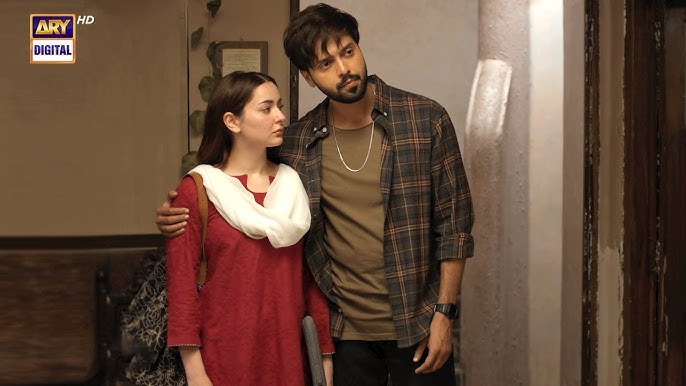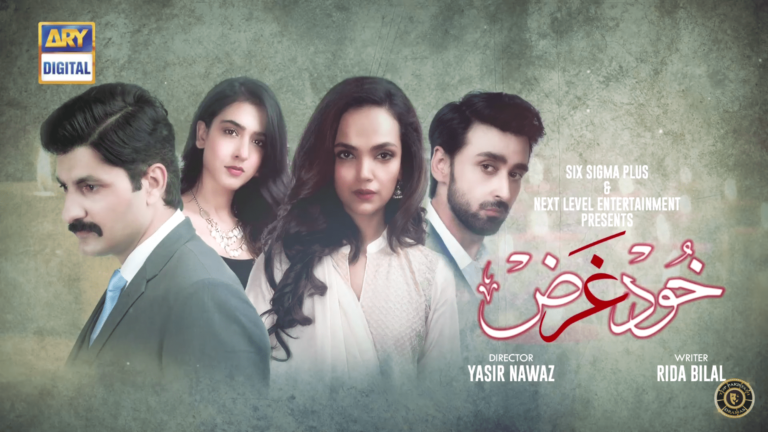Yes, Sharjeena and Mustafa were in love but their story is much more. Kabhi Main Kabhi Tum tackles economic survival, exploitation, and the evolving dynamics of modern relationships. As this young couple heads into the word they battle a greater villain than a mere evil relative, they also contend with systemic oppression, patriarchy, and the exploitation of workers. At its core, capitalism emerges as the ultimate villain of the story, slowly chipping away at Mustafa’s carefree youthfulness and leaving behind a shell of the man he once was.
The Urban Struggle
The home that they build is located in a familiar neighbourhood. Set in Karachi’s sprawling urban landscape, the show portrays the realities a city divided by wealth and poverty. From haggling aunties to children pulling pranks, the show captures the everyday moments that define life in tight-knit urban neighbourhoods.
However, the series also critiques the “elite bubble” that dismisses large parts of Karachi as “unlivable.” Sharjeena’s father calls their new neighborhood a “trash heap,” reflecting a common sentiment among Karachi’s privileged. This heap depicts the reality for more than half of the city’s population, who live in overcrowded, underserved areas far removed from the luxury. While some areas are insulated by gated communities, many others struggle with basic necessities like clean water, healthcare, and safe living conditions. For families like Sharjeena and Mustafa’s, a strong sense of community is absolutely essential in navigating these challenges.
The show also emphasizes the evolving expectations in modern marriages, where both partners contribute financially. Rather than framing Sharjeena’s career as a source of conflict, the drama normalizes her need to work, highlighting the pressures faced by couples today. By depicting how both Sharjeena and Mustafa juggle their professional and domestic responsibilities, the show underscores how economic hardship reshapes traditional gender roles in relationships.

Mustafa’s Evolution
Mustafa’s character begins with a carefree, “devil-may-care” attitude, oblivious to the growing financial pressures on the couple. Initially resistant to hard work or saving, he faces the harsh reality of mounting bills, debts, and the exploitative nature of their jobs. His transformation is one of the show’s most significant arcs. As the financial strain intensifies, Mustafa is forced to confront his own privilege and outdated notions of masculinity. He evolves from a passive partner into an active participant in providing for the family and confronting the capitalist systems that drive individuals into survival mode.
Yet, in this journey, capitalism acts as the ultimate antagonist. The constant grind of financial survival chips away at Mustafa’s youthful spirit, replacing it with exhaustion and a resignation to the harsh reality of their lives. The young, optimistic man that Mustafa once was—becomes a casualty of the very system that demands constant labor and sacrifice. By the end of the show, while Mustafa and Sharjeena find a measure of happiness in a home they can call their own, their relationship has undeniably taken a beating from the world around them. The toll of capitalism, with its demands for endless work and its disregard for emotional well-being, has stripped Mustafa of much of the joy and idealism he once had. He is left with a version of himself that is shaped by survival.
Mustafa’s Exploitation
Mustafa’s journey also highlights the exploitation of workers in the global south, particularly in the digital economy. As a game developer, he dedicates himself to creating a game called Hurricane, only to see his efforts go unrecognized. This narrative mirrors the exploitation often faced by workers in developing countries, whose contributions are undervalued or appropriated by those in the global north. The show critiques this systemic injustice, shining a light on how workers in the global south—particularly in creative industries—often remain voiceless and invisible.
Sharjeena’s Emotional Vulnerability
Sharjeena is portrayed as a strong, independent woman—confident and resilient. Yet beneath this exterior, she struggles with emotional vulnerability, especially as she navigates pregnancy. Despite being a capable professional, her requests for emotional support from her husband are dismissed as “clinginess,” reflecting how women’s emotional needs are often downplayed in a patriarchal society. Mustafa, unaware of her struggles, only begins to understand her emotional and physical toll when she experiences a health crisis. Even then, his reluctant attitude towards supporting her highlights the gender dynamics at play. Rather than willingly staying by her side, Mustafa treats her need for healing as an inconvenience. This portrayal underscores how, despite their strength, women are often left to fend for themselves emotionally in a society that enforces rigid gender roles.

Patriarchy, Financial Insecurity, and Bushra Ansari’s Character
One of the most compelling aspects of the show is Bushra Ansari’s portrayal of a woman driven by a desire for wealth. Initially, she comes across as greedy and materialistic, but the final episodes reveal a more empathetic side. Her obsession with money stems not from superficial desires but from financial insecurity. As a woman with no independent income, she is dependent on male breadwinners, which forces her into a survivalist mentality. The show doesn’t merely condemn her; instead, it offers a nuanced view of her actions, shedding light on the vulnerability many women face in a patriarchal society where their financial security is tied to the whims of male relatives. By presenting her as a woman struggling against the financial constraints of a male-dominated world, Kabi Main Kabhi Tum calls for a deeper understanding of women’s roles in economic survival.
Kabhi Main Kabhi Tum succeeds in reflecting the complexities of contemporary Pakistani life, particularly in urban spaces like Karachi. The show challenges viewers to reconsider their perceptions of poverty, class, and gender roles, urging a deeper understanding of the forces shaping the lives of those caught in the intersection of capitalism and patriarchy. systems that define modern life. At its heart, the show serves as a poignant critique of capitalism as the ultimate villain, pointing out how it not only exploits individuals but also erodes the very essence of their humanity. While Sharjeena and Mustafa find some semblance of happiness in the end, their relationship has been forever altered by the relentless pressures of the world they inhabit, urging viewers to reflect on the toll that modern socio-economic systems take on both personal lives and collective well-being.




 THE QUEEN OF MY DREAMS
THE QUEEN OF MY DREAMS  A heartfelt story
A heartfelt story 


 This summer, let your child explore,
This summer, let your child explore, 






 Saim
Saim 
